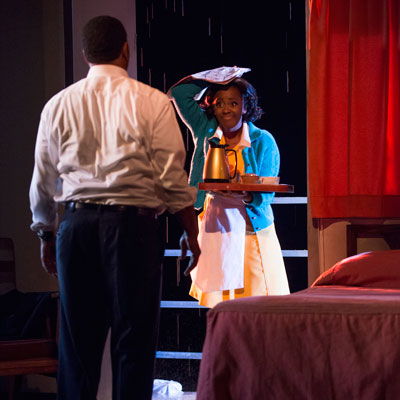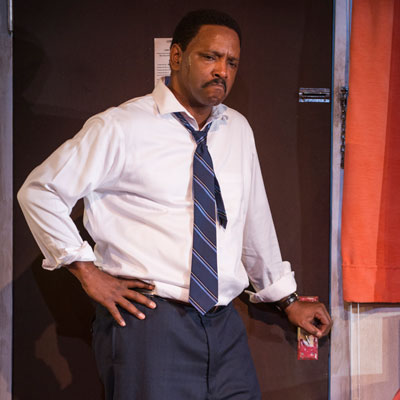‘The Mountaintop’ at Court: In Dr. King’s final hours, coffee served from a cup of revelation
 “The Mountaintop” by Katori Hall, at Court Theatre through Oct. 13 ★★★★
“The Mountaintop” by Katori Hall, at Court Theatre through Oct. 13 ★★★★
By Lawrence B. Johnson
On his last night on earth, exhausted from his civil rights campaign, the threat of assassination constantly before him, Dr. Martin Luther King, Jr., perhaps hinted at a premonition of his own end when he declared that he had “been to the mountaintop” and “seen the Promised Land.” Playwright Katori Hall spins that intimation into luminous fantasy in “The Mountaintop,” a transmigrational arabesque for two players that now irradiates the stage at Court Theatre.
 What is so honestly wonderful about Hall’s portrait of Dr. King is its unadorned and unashamed humanity. The man’s great work, his noble striving, is ever present, but in the background here. In the foreground is the mortal man, bone-weary and anxious but also resolute, inspired, indomitable.
What is so honestly wonderful about Hall’s portrait of Dr. King is its unadorned and unashamed humanity. The man’s great work, his noble striving, is ever present, but in the background here. In the foreground is the mortal man, bone-weary and anxious but also resolute, inspired, indomitable.
Such is the imposing figure that emerges from that rainy night, April 3, 1968, and into the shelter and merciful repose of a very modest motel room (the evocative work of designer Scott Davis). Though the man’s form seems to fill the space, his immediate needs are merely life-size: a cigarette (he has none), some coffee (room service is closed but somebody on the other end of the phone promises to rustle a cup) and blessed rest. There are two beds in the room: He flops first on one, rises, then flops on the other.
 Shortly, a light knocking on the door announces the promised coffee. It is delivered by a pretty young black woman, who bears the coffee in one hand and in the other a newspaper soaked from its service as umbrella. Her name is Carrie Mae, which she has ever borne in the contraction Camae. As the man in the room looks upon this delivery girl, a newly hired maid, his fatigue ebbs. They share a cigarette. He feels a lot better.
Shortly, a light knocking on the door announces the promised coffee. It is delivered by a pretty young black woman, who bears the coffee in one hand and in the other a newspaper soaked from its service as umbrella. Her name is Carrie Mae, which she has ever borne in the contraction Camae. As the man in the room looks upon this delivery girl, a newly hired maid, his fatigue ebbs. They share a cigarette. He feels a lot better.
Thus begins a night-long two-step, with occasional chase, by David Alan Anderson’s high-spirited, vulnerable Dr. King and Lisa Beasley’s worldly maid whose purpose is somewhat greater than fluffing pillows or carrying coffee.
Anderson and Beasley are a match made, well… Beasley’s Camae is a salty delight, a slip of a girl so charmingly direct that even her earthy language elicits only amusement from the preacher. She flirts with him, and he tells her – several times – that she’s about the prettiest thing he’s ever seen. (That’s between his calls home to speak with his wife.) The man well might be undone by the weakness of flesh, but Camae is having none of it. Even when they end up in an all-out pillow fight, the scene remains chaste.
 What is this? Who is this sassy, teasing, whisky-sipping minx – and where did she get that flask of throat-burning stuff anyway?
What is this? Who is this sassy, teasing, whisky-sipping minx – and where did she get that flask of throat-burning stuff anyway?
Like Dr. King’s premonition incarnate, Camae has come to the world-weary preacher bearing what seems to be confirmation of his own prophecy. As the night winds on, she also proves to be comforter and confessor. The world has indeed grown burdensome for the beloved – and despised – campaigner. As the storm rages outside, a great clap of thunder sends the preacher into a spasm of mortal fear. In one of the play’s most powerful speeches, Anderson’s Dr. King somberly, painfully confesses the dread instilled by almost daily threats on his life. He asks, why doesn’t God just take him and get it over with?
 That bomb-blast of thunder turns the tale, and redefines the chamber maid who only minutes before was laughing and grooving with a preacher who welcomed an interlude of unseen revelry. In a twinkling, the sass vanishes from Camae, replaced by a seraphic calm as she reassures the terrified man. It is a touching moment, this evidently ordinary girl taking the celebrated champion’s hands in her hands, soothing him, reminding him to draw breath.
That bomb-blast of thunder turns the tale, and redefines the chamber maid who only minutes before was laughing and grooving with a preacher who welcomed an interlude of unseen revelry. In a twinkling, the sass vanishes from Camae, replaced by a seraphic calm as she reassures the terrified man. It is a touching moment, this evidently ordinary girl taking the celebrated champion’s hands in her hands, soothing him, reminding him to draw breath.
But the dawn must come, and the day, and the blast that will not be thunder. Whoever would be ready for that – who would want to know? Such seeming knowledge would be the stuff of a very bad dream, indeed.
Court’s production, directed with lyrical elegance and finely etched humor by Ron OJ Parson, is crowned by a soaring epilogue that projects Anderson’s starlit peroration on Dr. King’s life onto a new plane, unforeseen and dazzling.
Related Links:
- Performance location, dates and times: Details at TheatreinChicago.com
- Playwright Katori Hall talks about “The Mountaintop”: See the video here
- Preview of Court Theatre’s 2013-14 season: Read the details at ChicagoOntheAisle.com
Tags: Court Theatre, David Alan Anderson, Katori Hall, Lisa Beasley, Ron OJ Parson, Scott Davis, The Mountaintop

